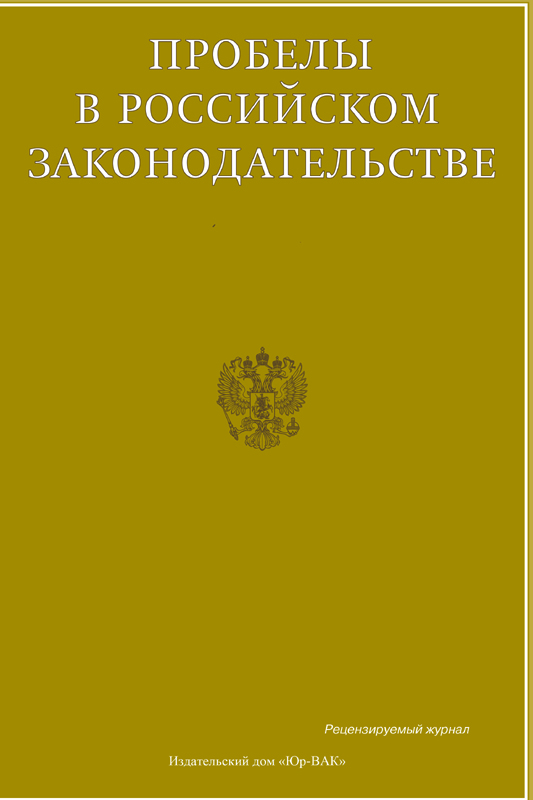Testimony as a Source of Evidence in Criminal Proceedings
- Authors: Kuliev I.B.1
-
Affiliations:
- North Caucasus Institute for Advanced Studies (branch) of the Krasnodar University of the Ministry of Internal Affairs of Russia
- Issue: Vol 15, No 4 (2022)
- Pages: 44-48
- Section: Articles
- URL: https://journals.eco-vector.com/2072-3164/article/view/531519
- ID: 531519
Cite item
Abstract
The purpose of this article is to consider the testimony of various persons and use them as evidence for the investigation of criminal offenses. Despite the fact that there are many types of indications, and there is no consensus among the authors regarding their classification, the author in this paper will adhere to the legislative division of indications into types. The topic raised by the author has been repeatedly raised in the circles of the scientific community. The author addressed this topic, for example, S.S. Alekseev, E.A. Zaitseva, B.V. Rosinsky, A.V. Pobedkin and others. The significance of their work is indisputable, but it does not indicate that this topic has been fully developed, many problems are touched upon in fragments and continue to be debatable and require scientific understanding. The objectives of the study are to identify persons whose testimony can be used as evidence, as well as to analyze the points of view of domestic processualists regarding the permissibility of using the testimony of anonymous witnesses, employees using pseudonyms, as well as specialists giving a conclusion [Novikov. 2010]. Conclusions: According to Part 2 of Article 78 of the Criminal Procedure Code of the Russian Federation (hereinafter the Code of Criminal Procedure of the Russian Federation) [5], the victim has the right and is obliged to testify in a criminal case. Such testimony includes all the circumstances of the crime committed, as well as the characteristics of the suspect's personality, and the specifics of the relationship with him of the victim himself, as well as other persons involved in the case. The problem with this type of testimony is that at a time of severe stress, the victim may exaggerate the "scale" of the event, apply a value judgment that cannot be attached to the case, since only actual events are important. The obligation to give evidence is also for witnesses. However, such information must have an evidentiary basis, that is, the source of the information provided must necessarily be announced to the investigation. Often the problem of witness testimony is their distortion, under the influence of discussions, and the exchange of impressions. The problematic area is the use of the testimony of anonymous witnesses, since in this case the rights of the accused are infringed, and the defense cannot fully analyze the data and the role of the person giving them in this case. The same problem applies to the testimony of law enforcement officers who may use pseudonyms. The testimony of suspects or accused is traditionally divided into a confession or denial of guilt. The problem here is the truthfulness and falsity of testimony, as well as often refusal. The problem area is also the testimony of a specialist. Since 2001, their testimony has been allowed to be used as evidence. However, there are still disputes about the legality of this provision. On the one hand, this is an expansion of the evidence base, but on the other, some processualists express the opinion that such a situation is unacceptable, since the legislation does not provide for punishment for this category for giving false testimony, which is absolutely not excluded. Also, the reason for the lack of scientific validity and subjectivity of judgments in the conclusions were pointed out against the use of expert testimony as evidence. Nevertheless, the testimony of a specialist is used today when an examination is not necessary. Thus, the lack of procedural regulation of the inclusion of these testimonies as a source of evidence is a problematic area of the criminal process. The problem of the use of a survey of the defendants in the case by a lawyer who can file a petition related to the improvement of the client's situation is also touched upon. However, there is no established form of such a survey, and there is a problem of attaching such testimony to the case, and their evidentiary value. Thus, the author raised the problem of legislative regulation of a single form of expert opinion, and the need to develop methodological recommendations on this issue, the same applies to the development of the survey form.
Keywords
Full Text
About the authors
Inal Borisovich Kuliev
North Caucasus Institute for Advanced Studies (branch) of the Krasnodar University of the Ministry of Internal Affairs of Russia
Email: inalkulinar2804@gmail.com
Police major, Lecturer of special disciplines Department Nalchik, Russia
References
- Bocharova I. A. Conclusion and testimony of a specialist as a source of evidence in Russian criminal proceedings / Young scientist. - 2021. No. 27 (369). pp. 179-181.
- Bykov V., Gromov N. The right of the defender to collect evidence // Legality. 2003. No. 10. p. 11 - 12.
- Kalinovsky K.B. Measures to protect participants in criminal proceedings as a general condition of preliminary investigation in the Russian criminal process // Problems of state protection of participants in criminal proceedings: materials of the inter-university. conf. (St. Petersburg, Sev.-Zap. branch of the RPA of the Ministry of Justice of the Russian Federation, March 6, 2007). St. Petersburg, 2007.
- Novikov S.A. Measures of protection of the interrogated person // Legal Consultant. 2010. № 12.
- The Criminal Procedure Code of the Russian Federation" (Code of Criminal Procedure of the Russian Federation) dated 18.12.2001 No. 174-FZ (latest edition) ConsultantPlus
Supplementary files









